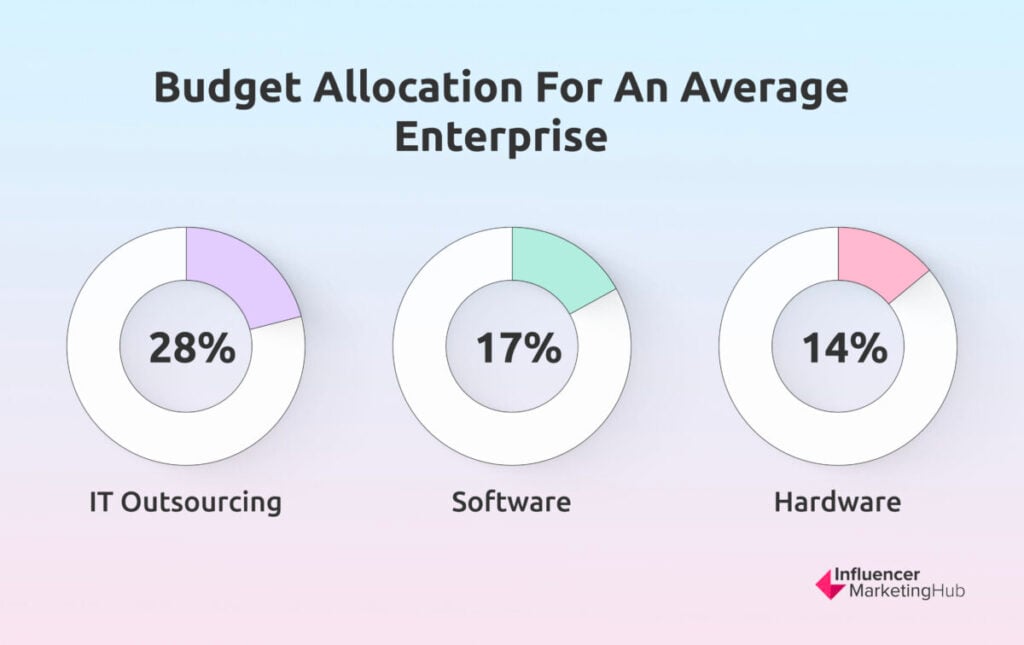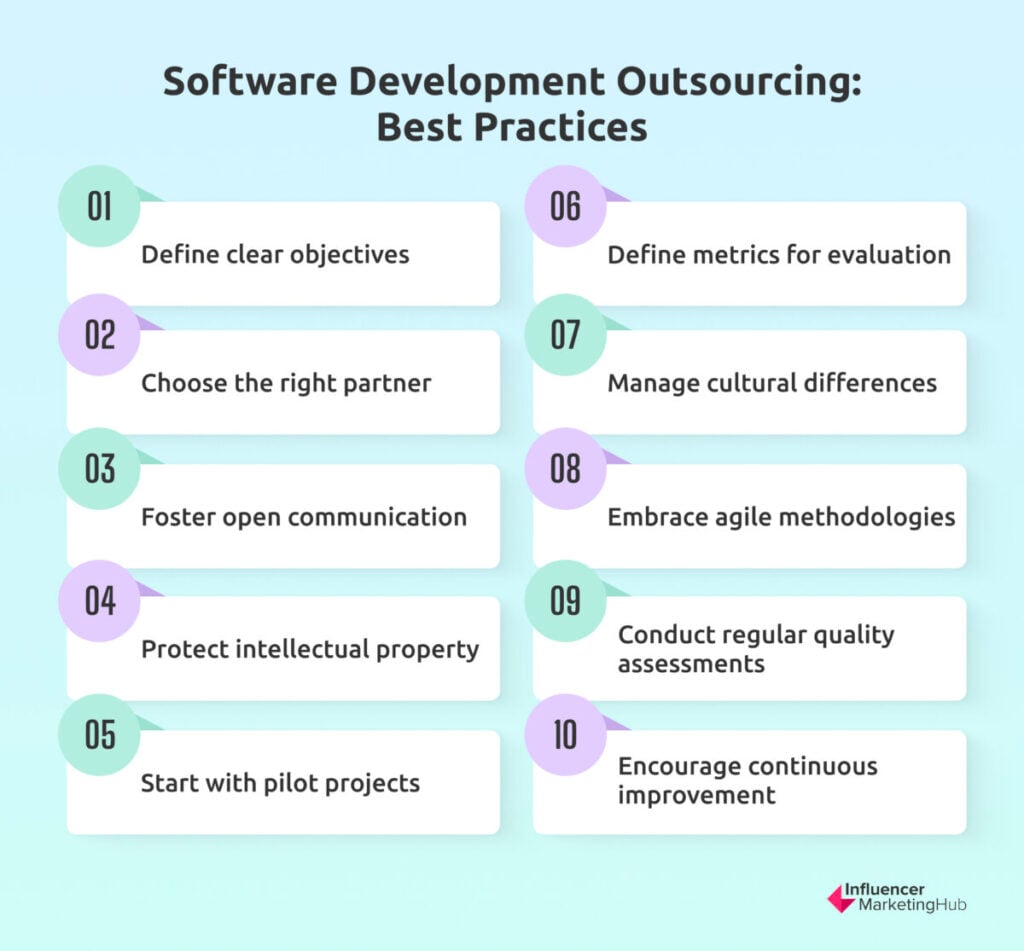As digitalization continues to permeate various industries and the use of enterprise applications becomes more prevalent, businesses are increasingly turning to software development outsourcing as a strategic solution. Embracing outsourcing not only addresses the scarcity of IT experts and resources but also empowers you to channel your focus on core business functions and save valuable internal resources and costs along the way.
If you're striving to keep pace in a rapidly evolving industry, understanding the power of software development outsourcing becomes an indispensable edge. By delving into the latest statistics and trends, you gain invaluable insights into the potential benefits this approach can bring to your business.
In this article, we'll navigate through the realm of software development outsourcing to explore its rising popularity and its relevance in optimizing business efficiency, fostering innovation, and achieving sustainable growth.
The Latest Statistics on Software Development Outsourcing Every Business Must Know:
How Does Software Development Outsourcing Benefit Businesses?
Software development outsourcing helps with the strategic reallocation of responsibilities and resources. This not only ensures streamlined operations but also enables businesses to stay ahead in a fiercely competitive market.
In addition, software development outsourcing presents a solution to the challenges related to IT talent scarcity and limited resources. It grants businesses access to a diverse talent pool of specialized professionals with domain-specific knowledge and expertise and advanced ecommerce platforms or tools that augment their capabilities. It also allows businesses to accelerate time to market, reduce development costs, and maintain a flexible workforce that keeps up with project demands. For small businesses, in particular, this offers a more cost-effective approach to handling software development.
As digital transformation becomes a fundamental necessity across industries, understanding the true potential of software development outsourcing proves vital for staying agile, innovative, and resilient in a dynamic business landscape.
The Latest Statistics on Software Development Outsourcing
Let's delve into the latest and most eye-opening statistics in the world of software development outsourcing.
Current State of IT and Software Development Outsourcing
- 79% of companies are outsourcing app/software development. The Deloitte Global Outsourcing Survey 2022 also shows that 76% of the executives who participated in the survey said that many of their IT functions are outsourced.
- According to the 2023 Outsourcing Benchmarks released by Forrester, the average enterprise outsources 28% of its IT spend. This is significantly higher than the 17% budget allocation on software and 14% on hardware. This can indicate greater reliance on outsourcing than on in-house development.

- In a PwC Pulse Survey in 2022, 60% of the surveyed executives said that digital transformation is their most critical growth driver in that year. This necessitates upskilling in the workforce. However, talent acquisition poses a challenge with the labor market tighter than before. To address this problem, 20% of enterprises are outsourcing some tasks.
- A Commit survey conducted in 2022 forecasts an increase of 70% in software development outsourcing among US startups between 2022 and 2023. The increase in outsourcing is seen as a result of a need to scale their businesses quickly and efficiently but at lower recruitment costs.
- In the 2022 Nordic IT Sourcing Study, 90% of clients are satisfied with their outsourced service providers. Relationship management gained the highest scores while delivering transformative innovation received the lowest satisfaction score.
Market Share by Segment or Region
- Precedence Research’s most recent study shows that the largest market in global IT services outsourcing is the Asia Pacific Region. China and India dominate the market, but Vietnam is emerging as a new destination for software development services.
- In 2023, the IT outsourcing market in Asia is expected to reach $101 billion, with a projected annual growth rate of 11.64% (CAGR) in the next five years. The average spend per employee in this market is estimated at $48.78. Specifically for application outsourcing, the average spend is $12.51 per employee.
- In application outsourcing, the largest market appears to be the United States with an approximate revenue of $43 billion in 2023. Asia, on the other hand, is projected to reach only $25.93 billion this year.
- While Europe can potentially generate $37.87 billion in application outsourcing this year, it appears to have slower growth than other regions. With a CAGR of only 1.13% in the next five years, its application outsourcing market volume is projected to reach only $40 billion in 2028.
- Capgemini, HCL Technologies, Alten, Cognizant, and Akkodis tops the Everest Group Engineering Services Top 50 for 2022. In this list, engineering services outsourcing includes software development and other activities related to digital engineering functions. Completing the top 10 leaders in the sector are Accenture, AFRY, Wipro, Tata Consultancy Services, and EPAM.
- When it comes to outsourcing app development, North America is among the most expensive regions for outsourcing, with developers charging $100 to $150 per hour. On the other hand, Asia offers the lowest outsourcing app development cost at rates of only $20 to $49 per hour.
Reasons for Outsourcing
- Asked about the primary drivers for outsourcing tech functions, 57% of business executives cited the need to cut costs as their main reason for traditional outsourcing. Other primary drivers are shifts in business strategy or operating model and access to new capabilities.
- A survey by Commit reveals that 48% of HR leaders see cost savings as the top benefit of outsourcing tech talent. With more than 68% of companies spending at least a month to recruit a single developer, outsourcing may be a huge help in keeping recruitment and onboarding costs to a minimum.
- In the Nordic region, the main driver for outsourcing is scalability. 63% of the respondents in the 2022 Nordic IT Sourcing Study indicated ‘more scalability to business needs’ as their primary reason for outsourcing. This is followed closely by ‘focus on core business’, with 61% of clients choosing to outsource to offload IT tasks.
Challenges and Concerns in Outsourcing
- In the Deloitte Global Outsourcing Survey, cybersecurity was identified as the top external challenge that organizations face. 81% of the surveyed executives said they relied on third-party vendors to gain new capabilities for their cybersecurity function.
- Among HR leaders and CTOs of US Startups, the greatest concern regarding software development outsourcing is the quality of work. 56% of the respondents indicated that this is something they worry about regardless of the role the outsourced talent would play.
Future Outlook
- By the end of 2023, the revenue in the IT outsourcing market is expected to reach $460 billion. Over the next five years, it is forecasted to reach over $770 billion by 2028. With an estimated annual growth rate of 11.07%, the outsourcing market definitely has a positive outlook.
- For the global IT services outsourcing market, Precedence Research projects a two-fold increase in market value in a span of around 10 years. The market value is expected to grow from $530.15 billion in 2021 to approximately $1.06 trillion by 2030.
- By 2024, there will be an estimated 28.7 million developers worldwide. As the global tech talent population grows, outsourcing is expected to be a main conduit for business enterprises to access specialized and high-quality talent.
Best Practices in Software Development Outsourcing
To maximize the potential benefits of software development outsourcing, adopting best practices is paramount. These 10 practices ensure successful and fruitful collaboration with outsourcing partners and enable you to achieve remarkable outcomes in your projects.

- Define clear objectives. Begin with a well-defined vision and objectives for the project. Clear and precise project goals set the foundation for a successful collaboration. They also align both parties toward a common vision, paving the way for better outcomes.
- Choose the right partner. Thoroughly research potential outsourcing partners. Look beyond cost considerations and delve into their expertise, experience, and cultural compatibility. A well-matched partner can be a catalyst for success.
- Foster open communication. Effective communication lies at the heart of a successful outsourcing partnership. Establish open channels for regular and transparent communication to make sure that both sides are informed, engaged, and aligned throughout the project's lifecycle.
- Protect intellectual property. Prioritize data security and intellectual property protection. Implement robust agreements and security measures to safeguard sensitive information. This will mitigate potential risks associated with data breaches.
- Start with pilot projects. Embark on the collaboration with smaller pilot projects before committing to more extensive engagements. This allows you to gauge the outsourcing agency's capabilities, work style, and suitability for long-term collaboration.
- Define metrics for evaluation. Set measurable performance metrics and key performance indicators (KPIs) to track progress and ensure project milestones are met. These metrics facilitate objective evaluations and timely adjustments, if necessary.
- Manage cultural differences. Understand and respect cultural nuances to foster a harmonious and collaborative working relationship. Embrace diversity and appreciate the strengths that diverse perspectives bring to the development process.
- Embrace agile methodologies. Agile methodologies are widely adopted for software development outsourcing due to their emphasis on collaboration, adaptability, and iterative development. Agile practices promote efficient problem-solving and quick response to changing project requirements.
- Conduct regular quality assessments. Consistently evaluate the quality of work delivered by the outsourcing team. Conduct feedback sessions and audits to ensure that the project adheres to predefined standards and meets expectations.
- Encourage continuous improvement. Cultivate a culture of continuous learning and improvement. Encourage the outsourcing team to stay updated with emerging technologies and industry best practices. This can foster a dynamic and innovative partnership.
By embracing these best practices, you can optimize your software development outsourcing efforts and unlock the full potential of collaborating with your external partners. Transparent communication, cultural sensitivity, and a shared commitment to excellence form the pillars of a successful outsourcing journey. They lead to enhanced efficiency, cost savings, and accelerated project success.
Leverage the Power of Software Development Outsourcing
Software development outsourcing has become an indispensable aspect of modern business strategies. The latest statistics highlight the growing significance of outsourcing in driving business growth and success. By understanding the main drivers, harnessing best practices, and leveraging the expertise of global talent, you can unlock the full potential of software development outsourcing and gain a competitive edge in a dynamic market. Embrace outsourcing thoughtfully and align it with your business goals to thrive in the ever-evolving technological landscape.
Frequently Asked Questions
What factors should we consider when selecting an outsourcing partner?
Selecting the right outsourcing partner is critical for project success. You should thoroughly evaluate potential partners based on their expertise, experience, and reputation in the industry. Cultural compatibility is equally important to foster effective collaboration. Most importantly, assess the outsourcing partner's communication protocols and data security measures to ensure a seamless and secure working relationship.
How can software development outsourcing help startups and small businesses?
Startups and small businesses often face resource constraints, hindering their ability to tackle complex software development projects. Software development outsourcing offers an ideal solution by granting access to a vast talent pool of skilled developers at cost-effective rates. By outsourcing non-core tasks, these businesses can focus on innovation, growth, and scaling their ventures without the overhead costs of maintaining an in-house development team.
What are the potential challenges of software development outsourcing?
While software development outsourcing offers numerous advantages, challenges may arise due to language barriers, time zone differences, and potential security risks. Miscommunication and cultural differences can impact project outcomes if not effectively managed. To address these challenges, careful planning, proactive communication, and selecting a reliable and experienced outsourcing partner are essential.
How do outsourcing partners ensure data security and confidentiality?
Reputable outsourcing partners implement stringent data security measures, including encryption, access controls, and secure communication channels. Non-disclosure agreements (NDAs) are also common to safeguard sensitive information and protect intellectual property.
Can software development outsourcing support Agile methodologies?
Yes, software development outsourcing is highly compatible with Agile methodologies. Agile practices emphasize iterative development, frequent communication, and adaptability, making them well-suited for collaborative efforts between in-house teams and outsourcing partners. Agile project management allows for greater flexibility, faster response to changing requirements, and continuous improvement, all of which are beneficial in a dynamic outsourcing environment.



